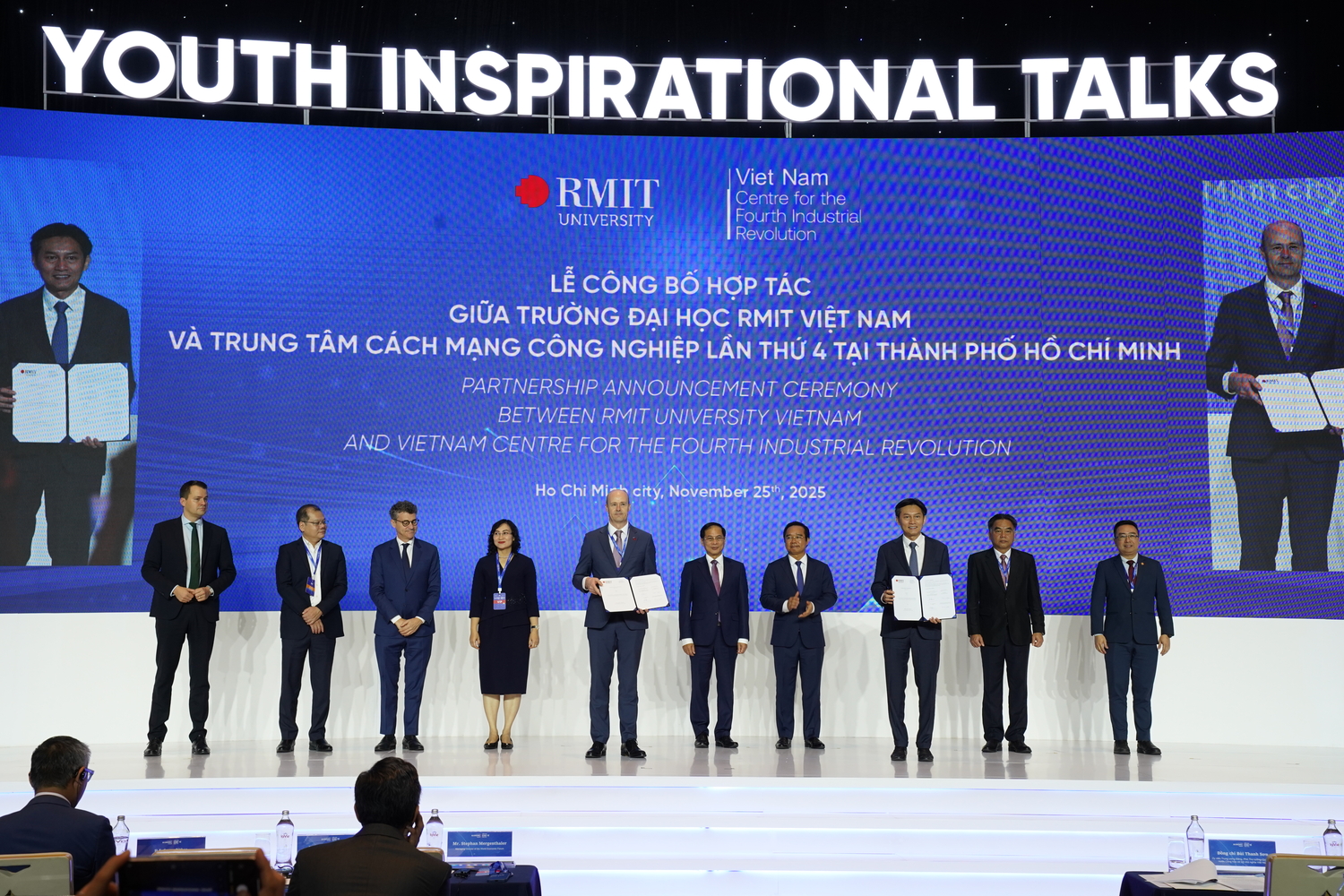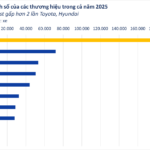The Youth Inspiration Talks, themed “Intelligent Generation NOW,” took place on November 25 as part of the Autumn Economic Forum 2025 in Ho Chi Minh City. This event underscored the pivotal role of Vietnam’s youth in crafting a smart and sustainable future.
Attracting 500 participants from universities, startups, youth-led enterprises, and research institutions, the forum facilitated dialogue with prominent international organizations such as the World Economic Forum (WEF), UNESCO, and the UN. The goal was to bridge gaps and devise solutions for Vietnam’s advancement.
This year’s program fostered dialogue, idea exchange, and collective action around a central question: “What will this generation do to shape the future?”
Leadership’s Vision for the Next Generation
Deputy Prime Minister Bui Thanh Son, representing the government, emphasized Vietnam’s position on the brink of a transformative era marked by AI, green initiatives, and digitalization. He highlighted the nation’s greatest asset—its population of over 100 million, particularly its intelligent, creative, and ambitious youth.
To achieve Vietnam’s goal of becoming an upper-middle-income country by 2030 and a high-income nation by 2045, the government is implementing landmark policies, including strategies for science, technology, innovation, and digital transformation. “Young people, the future stewards of our nation, are at the heart of these development policies, embodying our trust and high expectations,” stated the Deputy Prime Minister.
He reaffirmed Vietnam’s commitment to nurturing young talent and urged Vietnamese youth to embrace entrepreneurship for both personal and national growth. He expressed confidence that the next generation would help realize a “green, peaceful, and prosperous Vietnam” in the digital age.
Nguyen Van Duoc, Chairman of the Ho Chi Minh City People’s Committee, described today’s youth as the Intelligent Generation NOW—a cohort raised in a digital environment, equipped with open-minded thinking, advanced technological skills, and a proactive spirit. He emphasized the city’s reliance on this generation to drive the development of a modern, civilized, and globally integrated urban center.
“I am confident that the Intelligent Generation NOW will uphold the traditions of their predecessors and showcase Vietnam’s intelligence, resilience, and creativity on the global stage,” Mr. Duoc remarked. “The city is dedicated to creating optimal conditions to unlock and nurture the potential of our young people.”
From a global perspective, Stephan Mergenthaler, Managing Director of the WEF, shared insights into digital era trends and advised Vietnamese youth to prepare for the future of work. The WEF’s Future of Jobs report reveals that while human-driven tasks currently comprise 47% of corporate responsibilities, by 2030, 39% of core skills will evolve, demanding capabilities many workers have yet to encounter. Mr. Mergenthaler stressed that technology will not replace humans but will redefine uniquely human skills, such as creativity, resilience, curiosity, and lifelong learning. Collaboration between humans and machines is essential, with 62% of companies seeking employees adept at working with AI.
Jonathan Wallace Baker, UNESCO’s Chief Representative in Vietnam, emphasized that young people are not merely adapting to technological changes but are becoming key architects of the future economy and emerging technologies.
Amplifying Young Voices
During the “Voice of the NOW” session, six young Vietnamese representatives engaged directly with WEF and UNESCO leaders. Le Nguyen Bao Ngoc, Founder of Gen Zero, addressed concerns about digital inclusion for vulnerable groups and questioned how multi-stakeholder partnerships across the UN system, government, private sector, and youth networks could ensure equitable access to AI opportunities.

Mr. Mergenthaler emphasized that digital inclusion must be a cornerstone of Vietnam’s digital transformation, encompassing both technical and “soft” infrastructure, such as digital skills and literacy. Women, people with disabilities, and marginalized groups must be integrated into national digital public infrastructure strategies from the outset.
Regarding collaboration models, he suggested institutions “meet young people where they are,” utilizing youth-led digital platforms and creative channels. Networks like Global Shapers were highlighted as vital connectors between communities, policymakers, and international organizations.
UN representatives reiterated that inclusivity remains a core principle of UN, UNESCO, and WEF initiatives, with youth networks playing a crucial role in amplifying emerging voices in global dialogues.
Addressing concerns about over-reliance on AI and technology-driven FOMO in businesses, Mr. Mergenthaler emphasized, “AI is a tool to enhance thinking, not replace it.” The true value lies in identifying the right problems and merging human judgment with machine intelligence—an area where young people excel due to their adaptability and openness.
Fostering Collaboration Among Universities, Industry, and Government
The event also witnessed the signing of an MoU between RMIT University Vietnam and the Ho Chi Minh City Center for the Fourth Industrial Revolution (C4IR HCMC), marking a long-term collaboration in smart city development and R&D.
In an interview with VnEconomy / Vietnam Economic Times, Professor Scott Thompson-Whiteside, Pro Vice-Chancellor and General Director of RMIT University Vietnam, highlighted the event’s role as a vital platform for fostering dialogue between Ho Chi Minh City and global partners, experts, and stakeholders.

He stressed that the MoU establishes a strategic partnership combining the strengths of a global university with those of a leading policy and innovation institution. “Our shared goal is to support Ho Chi Minh City’s vision of becoming a regional hub for smart, inclusive, and sustainable growth,” he noted.
The partnership will leverage RMIT’s academic expertise, research capabilities, postgraduate talent, and global network to deliver practical solutions aligned with the city’s development priorities. By integrating policy formulation, technology application, and education, the collaboration aims to strengthen high-quality human resources for Vietnam’s future.
RMIT is also partnering with C4IR HCMC in the “Youth Inspiration Talks,” an initiative aimed at inspiring Vietnamese youth to actively contribute to a smart and green future.
Professor Thompson-Whiteside highlighted the MoU’s practical contributions, establishing a framework for cooperation in areas critical to Ho Chi Minh City’s innovation roadmap: smart urban development, talent development, applied sustainability research, and emerging technologies.
“In collaboration with C4IR HCMC, we plan to develop initiatives that enhance the city’s innovation ecosystem, from joint research programs and policy pilots to training activities that equip young professionals with future-ready skills,” he explained.
Both parties will also explore co-organizing international conferences and expert dialogues, bringing global perspectives and actionable insights to Vietnam. These efforts support the city’s digital transformation by facilitating knowledge exchange, encouraging technology adoption, and fostering stronger cooperation among government, academia, and industry.
Discussing the partnership’s role in strengthening the innovation ecosystem, Professor Thompson-Whiteside emphasized that RMIT’s mission has always been to connect education with industry and societal needs.
Under the MoU, RMIT aims to deepen collaboration among universities, businesses, startups, government agencies, and innovation centers through joint applied research projects, industry-engaged learning programs, sponsored PhD opportunities, and the development of environments that support experimentation, innovation, and technology commercialization.
“These initiatives bridge academic knowledge with real-world applications, accelerate the adoption of Industry 4.0 technologies, and directly contribute to Ho Chi Minh City’s long-term development goals,” he concluded.















